work sharing
Interesting point about the future of work...a more collaborative approach could potentially have other benefits
work sharing
Interesting point about the future of work...a more collaborative approach could potentially have other benefits
Accidents
Premise # 2
Stress
Here come the premises!
And according to British Here’s the smartphone study. research, the smartphone has the average employee working 460 more hours per year
Ouch
Economic growth was translating not into more leisure, but more stuff.
So...we don't have more time, but we do have more things
A well-rested worker was a more effective worker
Rebuttal...
Employers resisted, naturally
Here comes a counterargument....or refutation...
Too much free time was simply an invitation to wickedness
Do we still hold this view in some way? Is work "good for you"?
.”
Here he's bringing in two more heavyweights in the world of political/economic thought (Jefferson and Marx)
mankind would be confronted with the greatest challenge it had ever faced:
Here Bregman outlines Keynes' conclusion - but doesn't elaborate on why this will be a "challenge" - why do you think this is so?
In other words, for us
Note how he is using form here: the one-sentence paragraph. How might this be appealing to readers?
John Maynard Keynes
Already introduced as "the greatest economist of the 20th century" in the previous paragraph, here is some more info on Keynes.
In the summer of 1930
Giving some crucial background here about the conclusion Keynes came up with.
Quitting entirely is the only option for change. If you don’t quit, you are not creating the space in which Silicon Valley can act to improve itself.
This is why you must quit - monopolies are getting too powerful.
The unfortunate result is that once an app starts to work, everyone is stuck with it. It’s hard to quit a particular social network and go to a different one, because everyone you know is already on the first one
This "network effect" he describes is a rebuttal...
But the benefits of networks only appear when people use the same platform.
Here he outlines the benefits....the refutation to his argument.
Social media is biased, not to the Left or the Right, but downward. The relative ease of using negative emotions for the purposes of addiction and manipulation makes it relatively easier to achieve undignified results.
Social media is politically nonpartisan but ALWAYS appeals to our base natures.
We must start using terms like “addiction” and “behavior modification.”
Here he is looking at the relative connotations of the term "engagement" vs."addition". If we change the wording, perhaps people will better understand what is at stake?
We need to foster joy, intellectual challenge, individuality, curiosity, and other qualities that don’t fit into a tidy chart.
Behaviorism is a blunt instrument that does not foster these qualities in individuals.
negative feedback turns out to be the bargain feedback, the best choice for business
Regardless of the research, negative feedback sells more advertising dollars.
We can also experience camaraderie, sympathy, respect, admiration, gratitude, hope, empathy, closeness, attraction, and a world of other positive feelings when we interact with other people. On the negative side, we might feel fear, hostility, anxiety, resent- ment, repulsion, jealousy, and a desire to ridicule.
Here he defines "social emotions" that could potentially be evoked through our exposure and interaction with social media.
social pressure.
After addressing the mechanics of how behavior modification works, Lanier turns his sights to a second premise: "social pressure"
You keep on pleasing, hoping that a deeper pattern will reveal itself, even though there’s nothing but bottomless randomness.
A mix of positive and negative feedback leaves you in a pattern-seeking abyss.
which cats hate
Lanier loves a corny joke!
You are getting the equivalent of both treats and electric shocks when you use social media.
Strong line
Behavior modification
He is spending a lot of time to define this term and bolster the premise here that Behavior modification is why social media is destroying our collective free will.
will you, meaning you
Why does he switch from "we" to "you"?
the mournful confessions
Read the following two quotes with this in mind: why did Lanier choose to include them? What are they doing for his argument?
pervasive surveillance and constant, subtle manipulation -- is unethical, cruel, dangerous, and inhumane.
Main argument
B. F. Skinner
Here is a quick video on B.F. Skinner and his influence:
Please don’t be insulted
What is he doing here? What rhetorical device is this?
call direct manipulation of people advertising
Here is is defining "advertising" as opposed to "direct manipulation" - they are not the same thing.
perfectly primed
"Priming" refers to a psychological principle) whereby exposure to one form of stimuli leads to an unintentional and/or subconscious action (i.e., I see a commercial for pizza and decide to go out for pizza later that day).
and no one needs to know why
Mass data allows for machines to detect patterns and thus...predict behavior.
We’re all lab animals now.
Vivid image - use of pathos.
engineered feedback
What does he mean by "engineered" in this context?
called smart speakers
Here he is referring to the Amazon Echo or similar
THE CAGE
"The Cage" (as we shall see in the next paragraph) is a metaphor for the smartphone
fedesl
May mean a boarder under the king's protection or may refer to an obligation to provide the king food and drink (if one defaults on this obligation, he is to pay 20 shillings).
grind- ing slave
A “grinding slave” was presumably one whose job it was to prepare meal from grain; she had a higher status than a simple house slave , but a lower status than the king’s own slaves.
incapable of love

Mount Cenis

the ship of his heart
Ah, this is just lovely.
he
Here he is going to detail the life of St. Anselm, an Italian Benedictine monk, who would become the archbishop of Canterbury from 1093 to 1109.
Eadmer
Eadmer was "was an English historian, theologian, and ecclesiastic."
Speculum
This was a quite popular form of medieval literature.
Robert Grosseteste
Grosseteste "was an English statesman, scholastic philosopher, theologian, scientist and Bishop of Lincoln."
etc.
Curious as to how this whole thing resolved? Here is an excerpt from this source:
"...despite being put under considerable pressure, Margery (who was staying with her family while Richard was on the run) consistently attested that vows had indeed been exchanged. While the issue of whether the marriage had been consummated was an issue to the family, ultimately the issue of the vows that had been spoken was of paramount legal importance. As a consequence of Margery's consistent testimony the bishop finally upheld the marriage."
my mistress
Here he is referencing Marjory's mother - who he works for.
a thousand years
What would a love letter be without a little hyperbole?
Paston Letters
The Paston Letters are significant as they provide both a uniquely candid and detailed insight into the life of this family, who while being a member of the landed gentry (and far from common) were not aristocrats. For more information see: Paston Letters
Elizabeth Paston
She is well known from this collection of letters for her refusal to marry a succession of men her family pushed upon her. Eventually, she does marry Sir Robert Poynings.
Minerva
Also called Athena in Greek pantheon - the goddess of wisdom and warfare.
Isis
Reference to the Egyptian goddess Isis, though she is not exactly an equivalent to Ceres (she was associated with other functions in addition to safeguarding the harvest).
lazy nomads from gloomy ignorance
Here, in many ways, is the crux of many feminist arguments of Pisan's day - it is utterly ridiculous to think of women as "lesser" beings because they are the sources of life (Eve), redemption (Mary) and sustenance (Ceres). In many ways, they are thus the cornerstones of culture and human betterment.
queen Ceres
This is a reference to the goddess of the harvest, Ceres )(know as Demester in the Greek pantheon); her name comes from the Indo-European root meaning "to satiate, to feed", which is also the root for Latin crescere "to grow" and through it, the English words create and increase. And of course, cereal. Yum.
Your father
Here, she is referencing Thomas de Pisan, a native of Venice who would become Charles V's court astrologer/doctor.
she had a little curtain drawn in front of her.

Novella
She was a well-known law professor as was her sister, Bettina.
he gained more through Mary than he lost through Eve
This is a key theological point: if Eve had not set the wheels in motion...humanity would never have needed to be redeemed and so Christ would not have been visited upon earth to proclaim his teachings and sacrifice himself for the good of mankind. Amelia Lanyar will take up a similar argument elsewhere in this textbook...
women may have a refuge and defense against the various assailants
This reminds me of Charlotte Perkins Gilman's Herland (1915). I highly recommend!
I did not find several chapters or certain sections attacking women, no matter who the author was.
This is very true and was persistent; see: Gender Relations from this textbook for examples from English writers (several centuries later).
natural woman
Matheolus
She is referring to this author and his antifeminist work (he argued that marriage made men's lives miserable).
Book of the City of Ladies
Pizan's most famous work was a response to Roman de la Rose, which was controversial for its sensual langugae. Pizan here creates a "city of ladies" - prominent women throughout the ages whose worth to society is self-evident. She also advocates for comprehensive education of young women and girls.
Seulete sui
You can hear it in the original French here.
Christine de Pizan
Well-known author and proto-feminist; de Pizan was a moralist and philosopher who wrote scathing social commentary in addition to ballads. 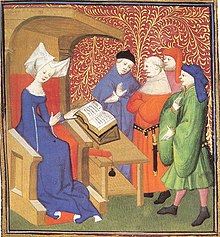
Lewes chess pieces
Here are two of them (they have a fascinating history - definitely worth further investigation):
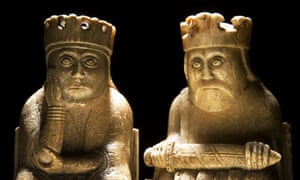
first illustration

avarice
i.e., greed
widowhood
How long must widowers mourn?
bound
How do you interpret the word "bound" in this context?
We do not say these things
I think even he knew he went too far in the previous sentence...this is a convenient addendum.
mattock
Like a pick-axe: "an agricultural tool shaped like a pickax, with an adze and a chisel edge as the ends of the head."
patrimony
"property inherited from one's father or male ancestor"
the civil authorities
We can witness this in the laws above - nuns were often targeted and generally were quite vulnerable as they lived in isolation and were ill-equipped to fend off individual attacks let alone invading forces.
Andreas Capellanus
Also called "Andrew the Chaplain" is most famous for this work (called De Amore in the original Latin) which - contrary to this title - is a rather cynical take on love.
when marriages are to be contracted they shall be publicly announced in the churches by priests
These are called "marriage banns" and were put in place so that the community could "object" if they knew of any reason why the couple could not be married.
unbelief
"children of unbelief" refers to the inhabitants of Sodom and Gomorrah, whose destruction is told in Genesis 19.
the Fourth Lateran Council
This was a meeting of Church leadership to define rules and regulations for the Christian world; two major decisions were made: trasnsubstatiation was defined and Jews/Muslims living in Christian lands were compelled to dress distinctively from their Christian neighbors.
75
This is quite progressive (especially in comparison to Cnut's laws).
heriot
"a tribute paid to a lord out of the belongings of a tenant who died, often consisting of a live animal or, originally, military equipment that he had been lent during his lifetime."
prosecution
Presumably, if there is some doubt, as opposed to getting caught in flagrante.
nose and her ears:
hey, hey! What happened to the Wergild?
wergild
"Wergild" is man-price or "blood-money" - a restitution paid to the victim's family or owner of the stolen property.
Cnut
Cnut the Great (995-1035) was king of the "North Sea Empire" (England, Norway and Denmark), and has been recorded by at least one historian as "the most effective in Anglo-Saxon history". 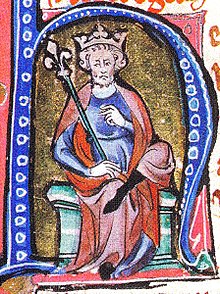
15 shillings to the king.
...as you do...
buy from the owner his consent [to the marriage]
So, after kidnapping, he is allowed to "buy" consent for the marriage. 
morning-gift
"the term morning gift refers to an old custom in which the husband would give a present to his wife the morning after the marriage was consummated."
maiden
This was the generic term for an unmarried virgin at the time (it does not relate to lady-in-waiting or maid-servant necessarily).
commits any misconduct
This sounds rather broad...
freeman
"Freemen" were peasant who owned their own land - usually very small portions that allowed for them to subsistence farm independent from overlords.
sceattas
"A sceat was a small, thick silver coin minted in England, Frisia and Jutland during the Anglo-Saxon period."
50 shillings
According to this helpful source, 50 shillings would have bought you a helmet during these times (and is roughly eqivalent to 5,000 Pounds Sterling in today's money).
Aethelberht
Aethelberht (550-614) was an Anglo-Saxon king and was the first British ruler to convert to Christianity. The influence of Roman/Latin culture compelled him to be the first king to write down any laws - so the following is an excerpt of the earliest written code in any Germanic language.
Because the coffer did round it close, A precious pearl it came to be.
There are two striking images here - that of a rose which has "failed" and withered and a pearl whose very existence began with the closing of its "coffin" (or clam shell).
joyless jeweler
She is the "pearl" and he, as her father, is the "jeweler" - how do you interpret this metaphor?
And thou livest in a life of light, A world where enters sin nor scorn.
She is in heaven where no "sin" can "enter".
bedight
"equipped, dressed, arrayed"
How shall my voice her flight forestall
He is wondering what to say so that she might stay a little while..how he can use his "voice" to "forestall" her departure.
ven as of yore,
He recognizes her very expression.
Shone the maiden on the farther shore.
This is one of the most striking images of the poem and was immortalized (in minature illustration) in the Cotton manuscript itself: 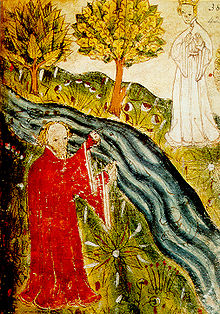
her
What is he referring to here as "her"?
Bliss brims my brains
Strong line (and lovely example of alliteration).
beryl
A mineral (the green variety, emerald, is the most highly prized of its type): 
essayed
"Essay" being used here in its original French meaning of "attempt" or "try" (from which we draw the composition genre)
citole
"An archaic musical instrument whose exact form is uncertain, generally shown with four strings."
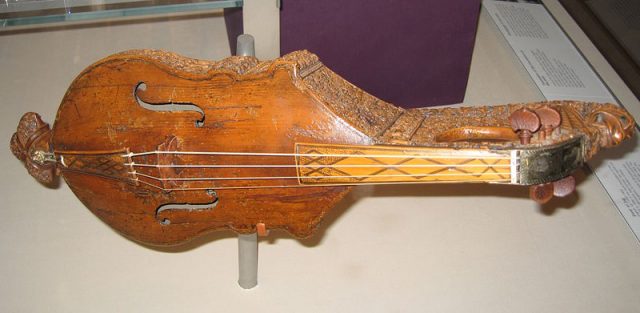
boles
tree trunks
I fell upon that flowery plot,
Here, the narrator has fallen asleep in his garden (his dream vision will begin in the next part).
corn
Note that "corn" (as we know it) is not brought to Europe until the discovery of the Americas. Here, "corn" is actually another term for wheat.
Of good come good things,
I am reminded here of the cycles of birth and rebirth in the eastern Buddhist tradition...
How clay should her bright beauty clot;
What is he referring to here?
verity
truthfully
bid
i.e. "make" - "make my sorrow go away/flee"
he seized a sword and pierced Jack Straw
This scene has been the subject of a lot of artistic interpretation; for example:

all the warrens, well waters, park, and wood, should be common to all,
This is a key point - there were A LOT of vacant lands in the years after the plague - one of the proposals was for this vacant land to become "communal property" among the common folk.
Wat Tyler
Wat Tyler (Walter the Tiler) was the leader of the revolt.
King Richard II
Also known as Richard of Bordeaux; he succeeded his grandfather (Edward III) at the age of 10. While modern historians no longer regard him as "insane" he likely suffered from a mood disorder and is remembered for the last two tyrannical years of his reign before being disposed and starved to death in captivity.
what cometh of our labors they keep and maintain their estates:

nor shall they do so till everything be common
He is arguing for dissolution of the social/economic classes here.
excessive apparel of diverse people
Note these descriptions as you read Canterbury Tales (coming up!)
under color of piety or alms, to give anything to those who can very well work
Sounds like an age-old argument...here's David Cameron's campaign tagline from 2010:

farriers
A person who shoes horses.
Regulations,
Said to have been written by John Ball.
John Ball
A travelling preacher) who insisted on social equality and was a English Lollard priest.
But the English, following, surprised them and killed many of them. …
Even during the plague, the English and Scots managed to wage war against each other. The hate is real.
4s
Note that the "s" here stands for shilling; "d" for pence. You can find out more about medieval currency here.
plenary remission
Basically, so many are dying so quickly that it is impossible for them to confess before they die - here the pope gives special dispensation that everyone is "sinless" at the point of death to ensure they go to heaven.
which is quite enough.
Salty.
It began first
Here is an animated map of the spread across the Mediterranean.
the vulgar tongue
"Vulgar" meaning "common" - likely referring to English here when he says "vulgar tongue" or else to Vulgar Latin.
Ralph of Shrewsbury
Medieval bishop and chancellor of Oxford university.
one league
A European unit of measurement; in England, it was roughly the equivalent of 1 league = 3 miles.
Prince Edward
"Edward the Black Prince" was remembered as one of the most chivalrous and worthy knights of his age. He would not live long enough to succeed his father, Edward III, as king and so his son (Richard II) would inherit the throne.
they looked upon the field as their own and their enemies as beaten.
This is quite the enduring image.
sun shone very brightly

Jean Froissart
A medieval author and court historian; his recollections (as here) of the 100 Years' War are among the best records we have of this time period.
Hundred Years’ War
This is a rather complicated war (that lasted over a hundred years and forever changed the face of Europe); here is a brief explanatory video:
Genoese cross-bowmen
A famous military corps in the middle ages that regularly acted as mercenaries for other European nations - famous for their crossbow: 
St. Denis.
According to hagiography, he was Bishop of Paris and is today known as the patron saint of France.
reconnoitre
"make a military observation of (a region)."
In 1318
It wouldn't be until 1322 that England was back to its former standing.
Saturn, cold and heedless
In astrology, Saturn is associated with challenges and difficulties; to this day, astrologers document the patterns of Saturn to anticipate major challenges or changes in one's life (i.e., Saturn return).
dogs and horses
It may have gone even farther...there were reports of cannibalism during this time.
hundred years
It is worth noting that the 11-13th centuries were times of widespread prosperity throughout all of western Europe. The official "end" is documented here - this famine was just as widespread.
Famine
Now known historically as the "Great Flood and Famine of 1315-1317".
perished long ago
While we now know many explained natural disasters (in previous eras) on the capriciousness of gods, a recent study suggests that gods were invented in the first place as a result of widespread famines/floods (which would explain the "great flood" motif in world mythology).
portents
A sign/warning of oncoming calamity (something bad is about to happen...)
victuals
food provisions
parliament
The history of the English (and later Great British) parliament is an interesting one - it was one of the only bodies of its kind in Europe during this time and its power would eventually supercede (and, as a result, restrict) the power of the monarchy.
a city
The poem itself - mirroring its subject matter - seems to trail off in decay...
failed
The "xxx" below indicate lines that were lost.
trod past
are gone
calamities
Yet another translation for "wyrd" - "fate" or "destiny" or "happenings".
must always be sad at heart,
These difficult lines have been read as a particular reflection, imagining the mental state of her distant beloved, or as a general reflection on the double-faced nature of the world.
earthen cave
Or even "earthen barrow" or "earthen grave"
feuding
hatred
take this grove
"live here" - or "live in a (pagan) shrine"
wracked ways
also translated as "my exile"
wrack this riddle
"make this song"
One may easily sever what was never bound fast, our mutual riddling…
Better translation: One can easily split/ What was never united/ The song of the two of us.
whelp
"puppy" or "cub"
company
troops
chew him
i.e.,"devour" "kill"
gift
Interestingly, the Old English "lac" can also mean "battle"
Deor
The name means either "beloved" or "wild beast" and nothing else is known of this character.
Eormanric
King of the Goths who died around 375; in legend, he is the uncle of Theodoric and had a reputation for incredible cruelty.
wolven mind
"wolfish wit"
All too apparent to many…
"Many knew that" - Theodoric was king of the Ostrogoths and ruled from 493-526. He would become the legendary Dietrich von Berne.
sleep.
Actually, we know nothing of Maethhild.
what must be done about it.
In the world of legend, it turns out better than you might expect: she is reconciled with Wayland and their child, Widia became famous as one of Dietrick von Berne's warriors in the Norse Thidreskssaga.
so can this
The old English line is almost passive: "it passed away with respect to that; so may it with respect to this."
bone-bonds
Wayland the Smith was the famous smith of Northern legend; his story is told in the Volundarkvida, the Edda and Thidrekssaga; King Nithhad (also mentioned here) is so greedy for Wayland's work that he cuts the smith's hamstrings to prevent his escape. In revenge (as we read in the next stanza) Wayland kills the king's sons, fashioning a bowls out of their skulls and presents this to the king. He then rapes and impregnates the king's daughter before escaping by means of a flying coat made of feathers.
wyrms
Meaning either "by sorrow" or "by worms" or "by hindrances" (translators cannot agree).
home
The final lines shift in tone - it seems that the poem is actually a sermon of sorts (that is, the voice of a preacher rather than a seafaring narrator).
burned up upon a pyre
Or "full of fire". Translators note that there may be something missing here as it makes little sense.
unrelenting ground
sturdy foundations
be changed
tremble
after-speakers
Another kenning meaning "posterity"
weal
"that which is best for someone or something."
loaned on land.
At this point, the sea voyage is revealed to be a journey of spiritual discovery, as in the Hiberno-Latin Voyage of St. Brendan. Irish monks often boarded small boats, trusting in God to safely land them somewhere - some reached Iceland or farther afield. Many likely died in this attempt.
thought-locks
Love this kenning; the idea is that a thought "flies out" from one's subconscious mind, or their truest self.
Therefore
The disjunction between what has come before and what comes after this line is so great that it has been proposed that a second speaker is introduced here (there are no quotation marks in the manuscript that could clarify).
Therefore
"There" is the word "forpon" which points both forwards and backwards (meaning "therefore" or "because"); this creates difficulties for translators who are attempting to correctly translate the progression of events).
profound streams
"the high seas"
kinsmen
A half-line may be missing here. There is no break in the manuscript or the sense of the poem, but the line has only two stresses instead of the expected four.
Oppressed by chills
"Pinched cold"
Bitter breast-cares
"Hard heartache"
fortress
stability
troth
"keeps his word/faith" - these last lines offer an answer to the Wanderer's unresolved melancholy--the wisdom of self-control and the hope of Christian salvation.
mind
Could also mean "the one who was wise in his mind"
ancient work of giants
Ruined buildings are called "the work of giants" (enta geweorc) in several places in Old English literature.
molder
topple
muster in the murk
"why my spirit should not grow dark"
waves
Translators consider this to be an intense and "hallucinatory" scene whose meaning is not entirely clear.
mind
The Old English "ponne maga gemynd mod geondhweorfeo" could also mean "when the mind surveys the memory of kinsmen."
fallow
What might this term mean in the context of "waves"? How does it relate to the speaker's condition?
frozen spirit-lock
a "winter-bound spirit"
gold-friend
i.e., "gold giving friend"
these outcomes
Again, the term here is wyrd (see above note for definition).